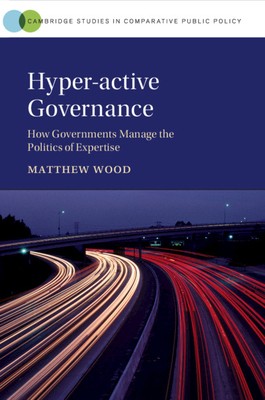
- We will send in 10–14 business days.
- Author: Matthew Wood
- Publisher: Cambridge University Press
- ISBN-10: 1009001809
- ISBN-13: 9781009001809
- Format: 15.2 x 22.9 x 1.5 cm, minkšti viršeliai
- Language: English
- SAVE -10% with code: EXTRA
Reviews
Description
Hyper-active Governance is a new way of thinking about governing that puts debates over expertise at the heart. Contemporary governing requires delegation to experts, but also increases demands for political accountability. In this context, politicians and experts work together under political stress to adopt different governing relationships that appear more 'hands-off' or 'hands-on'. These approaches often serve to displace profound social and economic crises. Only a genuinely collaborative approach to governing, with an inclusive approach to expertise, can create democratically legitimate and effective governance in our accelerating world. Using detailed case studies and global datasets in various policy areas including medicines, flooding, water resources, central banking and electoral administration, the book develops a new typology of modes of governing. Drawing from innovative social theory, it breathes new life into debates about expert forms of governance and how to achieve real paradigm shifts in how we govern our increasingly hyper-active world.
EXTRA 10 % discount with code: EXTRA
The promotion ends in 21d.16:45:16
The discount code is valid when purchasing from 10 €. Discounts do not stack.
- Author: Matthew Wood
- Publisher: Cambridge University Press
- ISBN-10: 1009001809
- ISBN-13: 9781009001809
- Format: 15.2 x 22.9 x 1.5 cm, minkšti viršeliai
- Language: English English
Hyper-active Governance is a new way of thinking about governing that puts debates over expertise at the heart. Contemporary governing requires delegation to experts, but also increases demands for political accountability. In this context, politicians and experts work together under political stress to adopt different governing relationships that appear more 'hands-off' or 'hands-on'. These approaches often serve to displace profound social and economic crises. Only a genuinely collaborative approach to governing, with an inclusive approach to expertise, can create democratically legitimate and effective governance in our accelerating world. Using detailed case studies and global datasets in various policy areas including medicines, flooding, water resources, central banking and electoral administration, the book develops a new typology of modes of governing. Drawing from innovative social theory, it breathes new life into debates about expert forms of governance and how to achieve real paradigm shifts in how we govern our increasingly hyper-active world.


Reviews